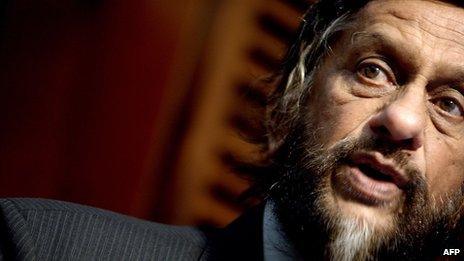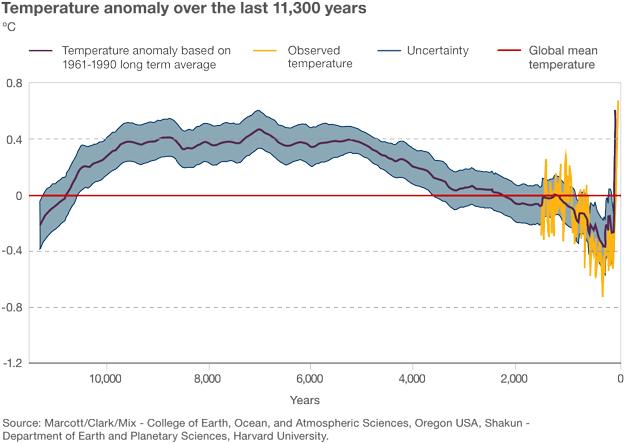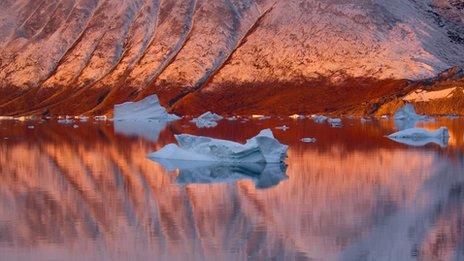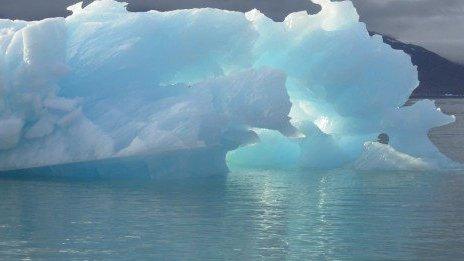Human role in warming 'more certain' - UN climate chief
- Published

Prof Pachauri represented the IPCC when it was awarded the 2007 Nobel peace prize
Scientists are more certain than ever that greenhouse gases from human activities are heating the planet, the head of the UN's climate panel says.
Rajendra Pachauri made the comments in an interview with BBC News.
The panel is due to deliver its latest report on the state of the climate later this week in Stockholm, Sweden.
Its last report was criticised after an error on glaciers unveiled other flaws, but Prof Pachauri said procedures had been reformed and strengthened.
He also dismissed suggestions of a slowdown in global warming.
"There’s definitely an increase in our belief that climate change is taking place and that human beings are responsible,” he told me.
"I don't think there is a slowdown (in the rate of temperature increase). I would like to draw your attention to the World Meteorological Organization which clearly stated, external on the basis of observations that the first decade of this century has been the warmest in recorded history.
"And I think the rest will be brought out by the report itself when it’s released."
Prof Pachauri’s insistence that warming has not slowed hints at a focus of debate this week in Stockholm: Global temperatures have not been increasing as fast as scientists predicted, and several governments insist that this puzzle is properly addressed in the final summary.
Have computer climate models overestimated the sensitivity of the planet to increasing CO2? Or has excess heat been stored up in oceans whence it will emerge to super-heat the planet in decades to come? Or both?
Or just perhaps it could be something else.
Unprecedented change
The draft says a doubling of CO2 concentrations in the atmosphere above pre-industrial levels (expected by mid-century) is likely to result in a temperature rise globally of between 1.5 and 4.5C.
Any rise above 2C could risk major changes on Earth, according to projections, but the results of recent modelling involves a downward tweak at the bottom of the range, offering the tantalising prospect to politicians that if humans are very lucky, they could get away with rising CO2 emissions for a bit longer than previously expected.

The panel is struggling to offer a definitive answer as to why warming is not happening at the rate previously projected. But it will be anxious to ensure that the likelihood of a fortunate escape for humanity should not be overplayed.
It is expected to say that greenhouse gas emissions from human activities have already warmed the ocean, melted snow and ice, raised sea levels and increased climatic extremes.
It will also warn that unless emissions are cut soon, we are likely to suffer severe changes in the climate unprecedented for hundreds of thousands of years.
Prof Pachauri’s leadership of the panel has been strongly supported by developing countries, although he has faced criticism in the West. He told me he had no plans to retire after the forthcoming report.
He said the panel enjoyed massive support, with 3,000 people volunteering to act as authors, 831 of whom were selected.
Tightening procedures
In the detailed text of its last report, the UN panel made a controversial mistake on glaciers.
Prof Pachauri said: "We made one mistake about the glaciers melting by 2035 - for which we have apologised. That was totally out of character because we always give a range for these things and it somehow slipped through.
"But it wasn’t included in the technical summary or the summary for policymakers, it just somehow escaped attention.
“What we did say about the glaciers was in substance not all that wrong – the glaciers are melting across the globe so that is something we stand by.
“This time we have been doubly careful... [that] we don’t have any mistake of that type. And I hope that [the report] will reassure everyone that human influence is having a major impact on the Earth's climate.”
Prof Pachauri said he anticipated attempts to discredit the panel. But he claimed evidence of extreme events was persuading more and more people, especially in the US, that humans were taking a risk with the climate.
Indeed, the report is expected to say it is very likely that manmade climate change has produced higher precipitation in America.
"Hopefully,” he said, “there are enough sane and sensible people in the public who will ultimately prevail."
The broader question is whether science itself will prevail over politics. Whatever the pronouncements of the UN panel, emissions are expected to continue to increase into the foreseeable future as politicians weigh risks to energy bills and competitiveness against risks to the planet.
The UN Secretary-General Ban Ki-moon has re-confirmed that he will invite world leaders to a climate summit next year in an attempt to galvanise action.
Follow Roger on Twitter, external
- Published23 September 2013

- Published23 September 2013

